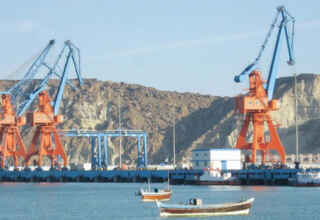
ISLAMABAD, Apr. 2 (INP); Maize-soybean intercropping, a prevalent cultivation pattern in China, has now found its way to Pakistan, altering the landscape of agricultural practices in the region.
Scientists of the National Research Center of Intercropping (NRCI) at The Islamia University of Bahawalpur have just finished spring sowing. This year the intercropping demonstration fields have spread across all provinces of Pakistan, China Economic Net (CEN) reported on Tuesday.
The journey started with Pakistani scientists acquiring this cutting-edge technology from their Chinese counterparts, envisioning its potential to revolutionize agriculture in their homeland.
Experiment and demonstration trials began in 2018, spearheaded by these scientists at local farms, showcasing their acquired expertise.
In 2021, under the vision of former Vice Chancellor of the Islamia University of Bahawalpur, Prof. Dr. Athar Mehboob, the National Research Center of Intercropping was established, comprising a team of local agronomists, breeders and soil scientists who ever studied overseas especially in China.
“This shift is primarily attributed to the pivotal role of maize and soybean as staple grains for both food and feed production, essential for sustaining economies across various nations.
In light of Pakistan’s agricultural needs, we want to uplift the country’s agricultural sector and improve the economic well-being of farmers,” said Dr. Muhammad Ali Raza, NRCI Director & International Researcher at Gansu Academy of Agricultural Sciences.
Presently, NRCI is demonstrating three major intercropping systems i.e. maize-soybean, sugarcane-soybean, and cotton-soybean at farmer’s fields in every province of Pakistan.
Dr. Muhammad Ali Raza and Dr. Sajad Hussain are leading the intercropping demonstrations in about 11 districts of Punjab (Bahawalpur, Khanewal, Layyah, Vehari, Lodhran, Multan, Pakpattan, Kasur, Sheikhupura, Chiniot & Faisalabad), 5 districts in Sindh (Hyderabad, Larkana, Khairpur Mirs, Thatha & Badin), 2 districts in KPK (DIK & Charsada), and 2 districts in Azad Jamu and Kashmir (Muzafarabad & Bhimber), and these initiatives are also making inroads in Balochistan, furthering the adoption of intercropping practices in the region.
NRCI is engaging in collaborations with multiple national and international universities and research institutes.
University of Agriculture Faisalabad (UAF), Bahauddin Zakariya University (BZU), PMAS Arid Agriculture University, Rawalpindi, Sindh Agriculture University (SAU), MNS University of Agriculture Multan, Ayub Agricultural Research Institute (AARI), National Agricultural Research Centre (NARC), National Institute for Biotechnology and Genetic Engineering (NIBGE), Sugar mill Industry and Chamber of Food and Agriculture are their local collaborators.
Internationally, NRCI is cooperating with Sichuan Agricultural University, Shandong Academy of Agricultural Sciences, Nanjing Agricultural University and Institute of Advanced Agricultural Sciences, Peking University to leverage global expertise for local advancement.
It’s learned that Prof. Xing Wang Deng and Dr. Feng Ling Yang form PKU are working closely with scientists and providing assistance in the form of germplasm of maize and soybean to enrich existing germplasm resources.
INP/javed































































































